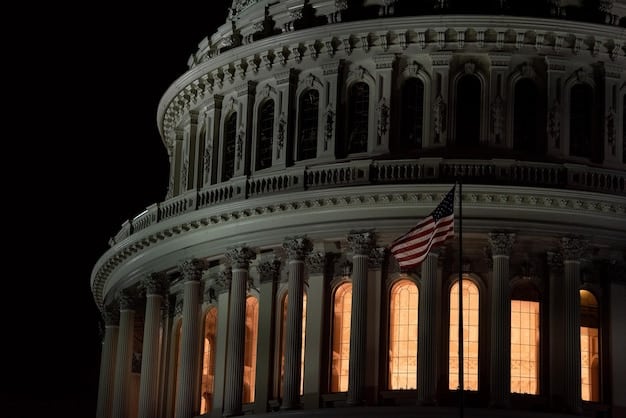Consequences for Political Figures Violating Campaign Finance Laws

Political figures who violate campaign finance laws may face consequences such as fines, civil penalties, impeachment, and even criminal charges, depending on the severity and nature of the violation.
What happens when politicians break the rules of campaign finance? Understanding the potential consequences for political figures who violate campaign finance laws is crucial for maintaining transparency and accountability in the U.S. political system.
Understanding Campaign Finance Laws
Campaign finance laws are in place to ensure fairness and transparency in political campaigns. These laws regulate how money is raised and spent in elections at both the federal and state levels. Violations of these laws can have serious repercussions for political figures.
These laws aim to prevent corruption and undue influence by wealthy donors. It’s important to understand what constitutes a violation to appreciate the potential consequences.
Key Aspects of Campaign Finance Laws
Understanding the nuances of campaign finance law requires some effort, but the basic principles are readily accessible. Here are a few key aspects:
- Contribution Limits: Laws limit the amount of money individuals and organizations can donate to political campaigns.
- Disclosure Requirements: Campaigns must disclose the sources and uses of their funds.
- Prohibitions on Corporate and Union Contributions: There are often restrictions on direct contributions from corporations and labor unions to candidates.
- Independent Expenditures: Spending by outside groups that advocates for or against a candidate must be independent of the campaign.
These elements work together to create a framework for fair and transparent elections. Violations, whether intentional or unintentional, can trigger serious consequences.
To summarize, campaign finance laws serve to maintain the integrity of the electoral process by regulating who can contribute, how much they can contribute, and how these contributions are disclosed.

Fines and Civil Penalties
One of the most common consequences for violating campaign finance laws is financial penalties. These can range from relatively minor fines to substantial civil penalties, depending on the severity of the violation.
These financial repercussions serve as a deterrent and aim to compensate for any unfair advantage gained through illegal campaign finance activities.
Types of Fines and Penalties
The exact amount and nature of the penalties can vary widely based on the specific violation and the jurisdiction. Here are some examples:
For example, failing to properly disclose contributions or expenditures can result in fines that increase with the amount of money involved. Accepting contributions that exceed legal limits can lead to penalties that require the campaign to return the excess funds.
- Failure to Disclose: Penalties for not reporting contributions or expenditures accurately.
- Excessive Contributions: Fines or the requirement to return funds received above legal limits.
- Improper Use of Funds: Penalties for using campaign funds for personal expenses.
These penalties can have a significant impact on a campaign’s financial resources and reputation. For example, a high-profile candidate caught using campaign funds for personal expenses could face severe public backlash, in addition to legal repercussions.
In conclusion, fines and civil penalties are a common form of punishment for campaign finance violations, acting as both a deterrent and a means of rectifying financial improprieties.
Impeachment Proceedings
For political figures holding office, particularly at the federal level, impeachment is a severe consequence. While not directly tied to campaign finance alone, violations can contribute to a broader case for impeachment.
Impeachment represents a formal accusation of wrongdoing that can lead to removal from office if the official is convicted.
The Impeachment Process
The impeachment process involves two key steps: accusation (impeachment) by the House of Representatives and trial in the Senate. A conviction in the Senate requires a two-thirds majority.
While impeachment is rare, the threat of such proceedings can serve as a significant check on potential abuses of power.
- House Investigation: The House of Representatives investigates potential impeachable offenses.
- Articles of Impeachment: If the House finds sufficient evidence, it drafts and votes on articles of impeachment.
- Senate Trial: The Senate holds a trial to determine whether to convict and remove the official from office.
For example, if a political figure is found to have misused campaign funds or accepted illegal contributions, this could be cited as part of a broader pattern of misconduct, leading to impeachment proceedings. The process is inherently political and can be influenced by partisan considerations.

To summarize, impeachment is a significant consequence that, while not exclusively tied to campaign finance violations, can be triggered by them as part of a larger pattern of misconduct, potentially leading to removal from office.
Criminal Charges and Prosecution
In more severe cases, violations of campaign finance laws can lead to criminal charges and prosecution. This typically occurs when the violations are intentional, involve large sums of money, or are part of a broader pattern of illegal activity.
Criminal charges carry the risk of imprisonment and can effectively end a political career.
Examples of Criminal Offenses
Specific criminal offenses related to campaign finance can include:
These offenses often involve deliberate attempts to circumvent campaign finance regulations for personal or political gain.
- Money Laundering: Concealing the source of illegal contributions.
- Fraud: Making false statements or submitting false reports to election authorities.
- Conspiracy: Working with others to violate campaign finance laws.
For instance, a campaign treasurer who knowingly accepts illegal foreign contributions and conceals them through a series of shell corporations could face charges of money laundering and conspiracy. The penalties for these offenses can include substantial fines, imprisonment, and a permanent ban from holding public office.
In summary, criminal charges and prosecution are reserved for the most serious violations of campaign finance laws, carrying significant legal and personal consequences for political figures.
Impact on Political Career and Reputation
Even if a political figure avoids criminal charges or impeachment, violating campaign finance laws can have a devastating impact on their political career and reputation. Public trust is essential for any politician, and these violations erode that trust.
The stain of scandal can linger long after the legal proceedings are over, making it difficult for the politician to regain credibility.
Long-Term Effects
The long-term repercussions of a campaign finance scandal can include:
These effects can be particularly pronounced in today’s hyper-connected media landscape, where news and accusations spread rapidly.
- Loss of Public Support: Voters may be less likely to support a candidate perceived as dishonest or unethical.
- Difficulty Fundraising: Donors may be reluctant to contribute to a campaign tainted by scandal.
- Damage to Credibility: The politician’s reputation may be permanently tarnished, making it difficult to be taken seriously on policy issues.
Scandals involving campaign finance can lead to the downfall of otherwise successful political careers. The loss of public trust can be insurmountable, making it nearly impossible for the politician to continue serving effectively.
In conclusion, even in the absence of criminal charges or impeachment, violating campaign finance laws can have severe and lasting consequences on a political figure’s career and reputation, undermining public trust and eroding their ability to lead.
The Role of Regulatory Bodies like the FEC
Regulatory bodies such as the Federal Election Commission (FEC) play a crucial role in enforcing campaign finance laws. These agencies investigate potential violations, issue fines, and pursue legal action against those who break the rules.
The effectiveness of these bodies is essential for maintaining the integrity of the electoral process.
Powers and Limitations
While agencies like the FEC have significant enforcement powers, they also face limitations. These can include:
The structure and funding of these agencies can significantly impact their ability to effectively regulate campaign finance and hold political figures accountable.
- Investigative Authority: The power to investigate potential violations and subpoena documents and witnesses.
- Enforcement Actions: The ability to issue fines, negotiate settlements, and pursue legal action in court.
- Limited Resources: Agencies may be constrained by budget limitations and staffing shortages.
For example, the FEC is often criticized for being understaffed and underfunded, which can slow down investigations and limit its ability to pursue complex cases. Partisan gridlock within the commission can also hinder enforcement efforts.
To conclude, regulatory bodies like the FEC are essential for enforcing campaign finance laws, although their effectiveness can be impacted by their powers, limitations, and the political environment in which they operate.
Preventing Violations: Compliance and Ethics Training
One of the best ways for political figures to avoid the consequences of violating campaign finance laws is to proactively ensure compliance. This can include implementing robust internal controls, seeking legal advice, and participating in ethics training.
Preventative measures can help ensure that campaigns operate ethically and within the bounds of the law.
Strategies for Compliance
Effective strategies for preventing campaign finance violations include:
These strategies can significantly reduce the risk of unintentional violations and demonstrate a commitment to ethical conduct.
- Internal Controls: Implementing procedures to monitor and track campaign contributions and expenditures.
- Legal Counsel: Seeking advice from attorneys specializing in campaign finance law.
- Ethics Training: Providing training to campaign staff and volunteers on campaign finance regulations and ethical standards.
For example, a campaign might hire a compliance officer to oversee all financial transactions and ensure that they comply with the law. Regular ethics training sessions can help staff understand their obligations and avoid common pitfalls. Creating a culture of compliance from the top down is crucial.
In summary, proactive compliance measures, including internal controls, legal counsel, and ethics training, are essential for political figures seeking to avoid the serious consequences of violating campaign finance laws.
| Key Point | Brief Description |
|---|---|
| 💰 Fines | Financial penalties for violations. |
| 🏛️ Impeachment | Removal from office for severe misconduct. |
| 🧑⚖️ Criminal Charges | Prosecution for serious offenses. |
| 📉 Reputational Damage | Negative impact on political career. |
FAQ
▼
Common violations include exceeding contribution limits, failing to disclose donations, and using campaign funds for personal expenses. Deliberate and accidental offenses both occur frequently.
▼
The FEC investigates potential violations, issues fines, and can pursue legal action in court to enforce compliance with campaign finance regulations and laws.
▼
While not directly impeachable on its own, campaign finance violations can contribute to a broader case for impeachment if they demonstrate abuse of power.
▼
Campaigns can implement internal controls, seek legal counsel, and provide ethics training to staff and volunteers to ensure compliance with campaign finance laws.
▼
Violations can severely damage a politician’s reputation, leading to loss of public support, difficulty fundraising, and a tarnished image that’s challenging to repair.
Conclusion
In conclusion, violating campaign finance laws can result in a range of consequences for political figures, from fines and civil penalties to impeachment proceedings and criminal charges. Moreover, even without legal repercussions, the damage to a politician’s reputation can be severe and long-lasting. Understanding these potential consequences is critical for maintaining integrity and accountability in the political arena.





